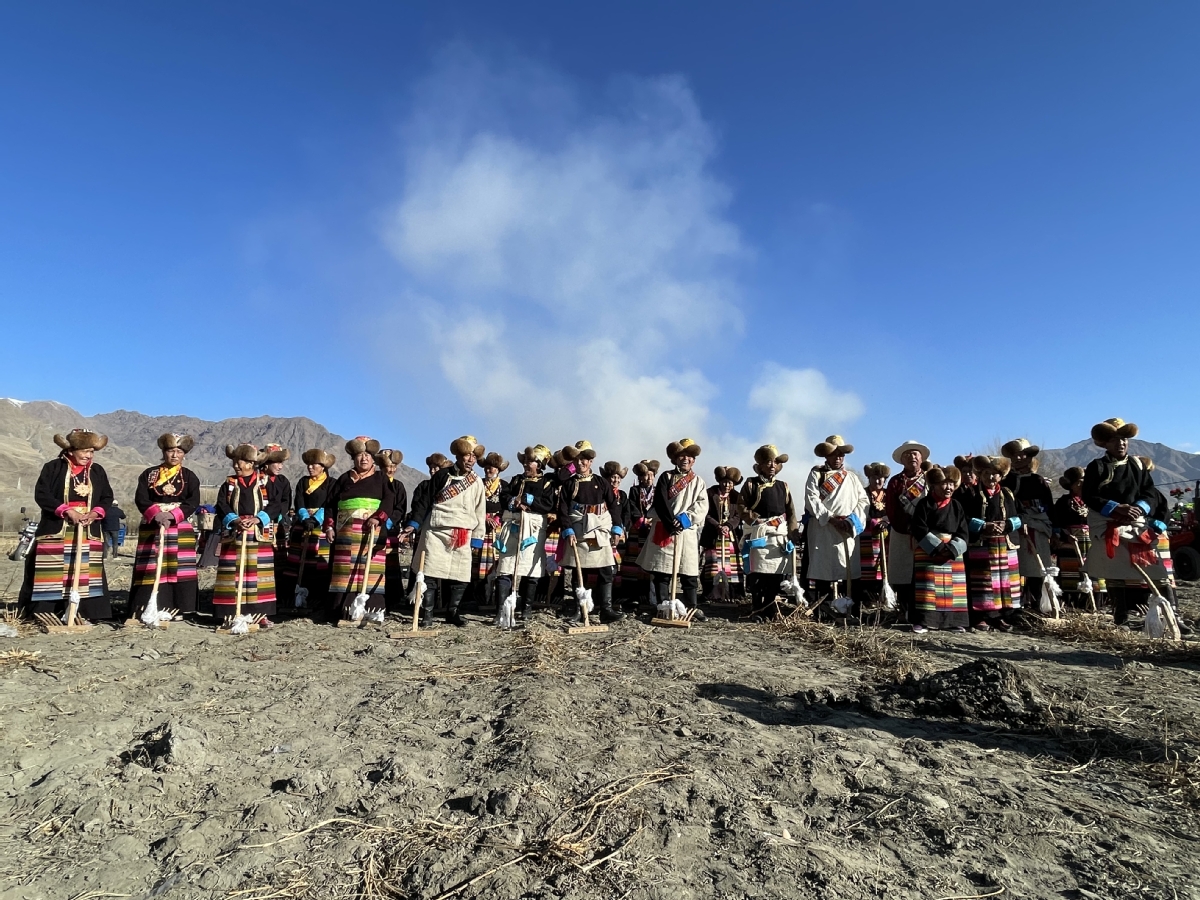Landmark village still living high life in Tibet
Updated: 2021-05-24 By DAQIONG and PALDEN NYIMA in Lhas (China Daily)  Print
Print 


 Tibetan farmers from Khesum village in Lhokha city, Tibet autonomous region, gather to celebrate the start of spring plowing earlier this year. CHINA DAILY
Tibetan farmers from Khesum village in Lhokha city, Tibet autonomous region, gather to celebrate the start of spring plowing earlier this year. CHINA DAILY
Conditions have changed immeasurably for residents of the first settlement in the region to adopt democratic reforms
Seven kilometers from Tsethang town, Lhokha city, in the Tibet autonomous region, the Yarlung Zangbo River flows quietly under the scorching plateau sun. Khesum, a village in Nedong district, is located close to this beautiful spot.
However, Khesum is not just famous for its beautiful scenery. Its claim to fame lies in its status as the first village in Tibet to adopt democratic reforms in the modern era.
The settlement is considered Tibet's "red land"-denoting its revolutionary culture-because it was the site of several "firsts" in Chinese history.
They include: the founding of the first rural grassroots branch of the Communist Party of China; the first peasant association; and the first people's commune in the region.
Before Tibet's democratic reform in 1959, Khesum was called Khesum Manor and was one of six manors belonging to a man named Surkhang, who owned serfs across Lhokha.
On March 28, 1959, the CPC led the people to launch democratic reforms that abolished the region's feudal, theocratic, serf-based society. The reforms liberated 1 million serfs and was a watershed moment for local society.
On Dec 2 that year, the region's first rural Party base was opened by a democratic reform working group, marking the abolition of theocratic feudal serfdom in Tibet.
Under the CPC's leadership over the past six decades, Khesum has enjoyed beneficial policies, and many changes have occurred in areas such livelihoods, healthcare, access to education, housing, agriculture and the means of production.
Today, the overall condition of the village and the lives of its residents reflect those major changes.
According to local residents, 60 years ago, most people in Khesum were subject to exorbitant taxes and levies by the owners of the manor, from generation to generation, and they suffered hunger, brutality and isolation under the feudal system.
Gangzuk, secretary of the Khesum Party committee, said his family was classified as serfs before Tibet's liberation in 1951. His parents were illiterate because they did not have the right to receive education.
"At that time, the manor owners did not provide people with enough food, which often left them starving," said the 58-year-old as he recalled his parents' lives before the reforms, adding that they were not given enough tsamba-roasted barley flour-to make food.
"They felt that they never had enough to eat, and when they felt hungry, they could do nothing but endure it," Gangzuk said.
He recalled that the serf owners bullied the people, who were often beaten whether they were in the wrong or not.
"The people had to work without enough food or clothing, and they had to work all the time. There was very little chance to take a good rest. After the democratic reforms, my family gained our own land, and I had the opportunity to receive an education, so I studied until the end of junior middle school," he said.
His fellow villagers now use machinery to cultivate the land, and they no longer have to worry about food or clothing, he added.
Gangzuk has four children: two work as civil servants; one works as a village official; and the youngest is studying at a university.
"Now we enjoy a good life. Our house has plenty of furniture and electronic goods, and my family's income was over 300,000 yuan ($46,000) last year," he said.
Investment
In the past 60 years, Khesum has been led by the CPC and the socialist system, resulting in great changes taking place.
Since the CPC's 18th National Congress in 2012, the central government has invested nearly 40 million yuan in Khesum, and the village has been turned into a pilot site for ecological civilization (a Party concept in which sustainable development is paramount), Xinhua News Agency reported.
The village has a drainage system, street lighting, a greening program-under which flowers and shrubs are planted to improve the environment-a public activity service center and a library.
In 2017, all the impoverished families in Khesum were removed from a list of poverty-stricken people, three years ahead of the regional target.
Khesum now has spacious roads and a convenient transportation structure. It is also connected to the 5G network, so villagers can keep abreast of developments around the globe via the internet and social media platforms.
"The serfs of the past have become the masters of society today. Hunger and poverty have become history, and the primitive slash-and-burn farming techniques and the ox-pulled plows have been replaced through the mechanization of agriculture," said Lian Zhikun, a civil servant in the village.
According to Lian, medical services have been substantially improved to provide better treatment for locals. Moreover, Tibet's modern education system means that since 2012 all children have been eligible for 15 years of free education, from kindergarten to high school.
Thanks to a range of policies introduced by the central and regional governments to benefit the villagers, Khesum's infrastructure and the quality of life have improved greatly, he said.
"Last year, the per capita disposable income of the villagers reached more than 24,000 yuan, and the main sources of income included agriculture, transportation and part-time jobs," he added.








